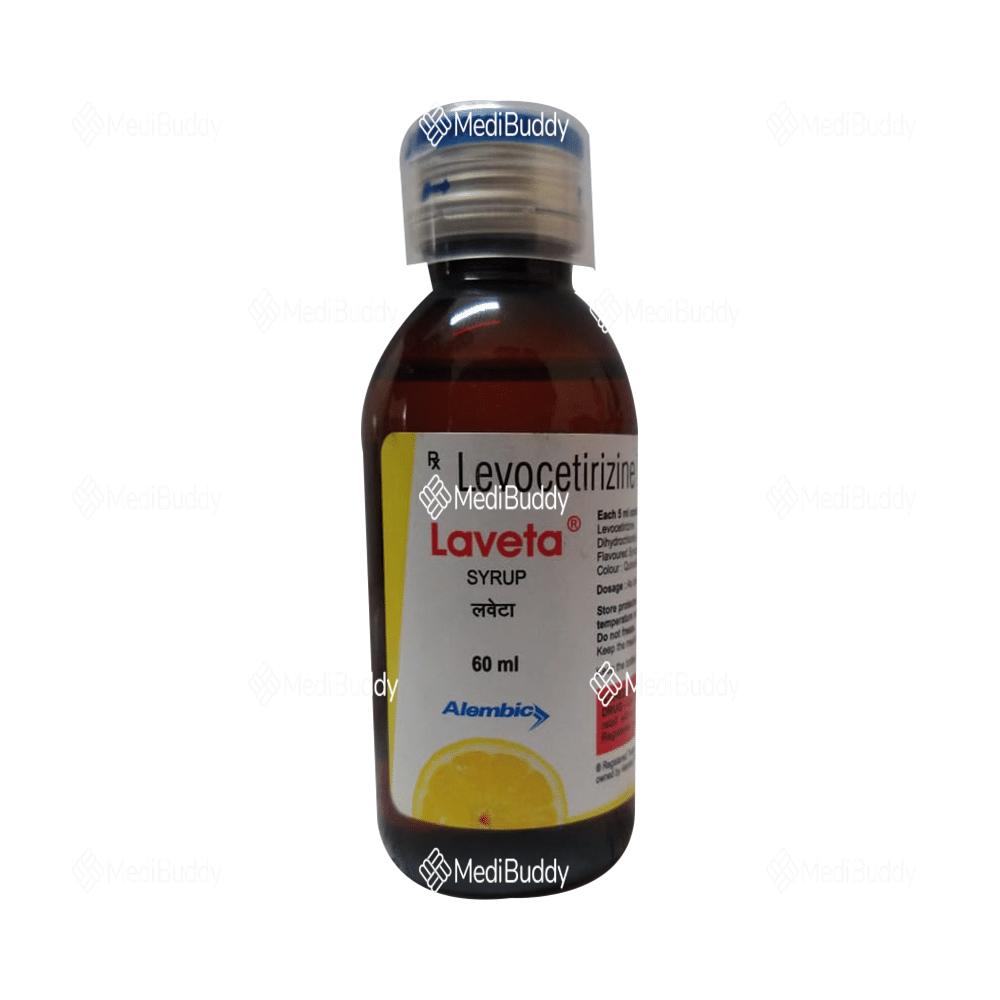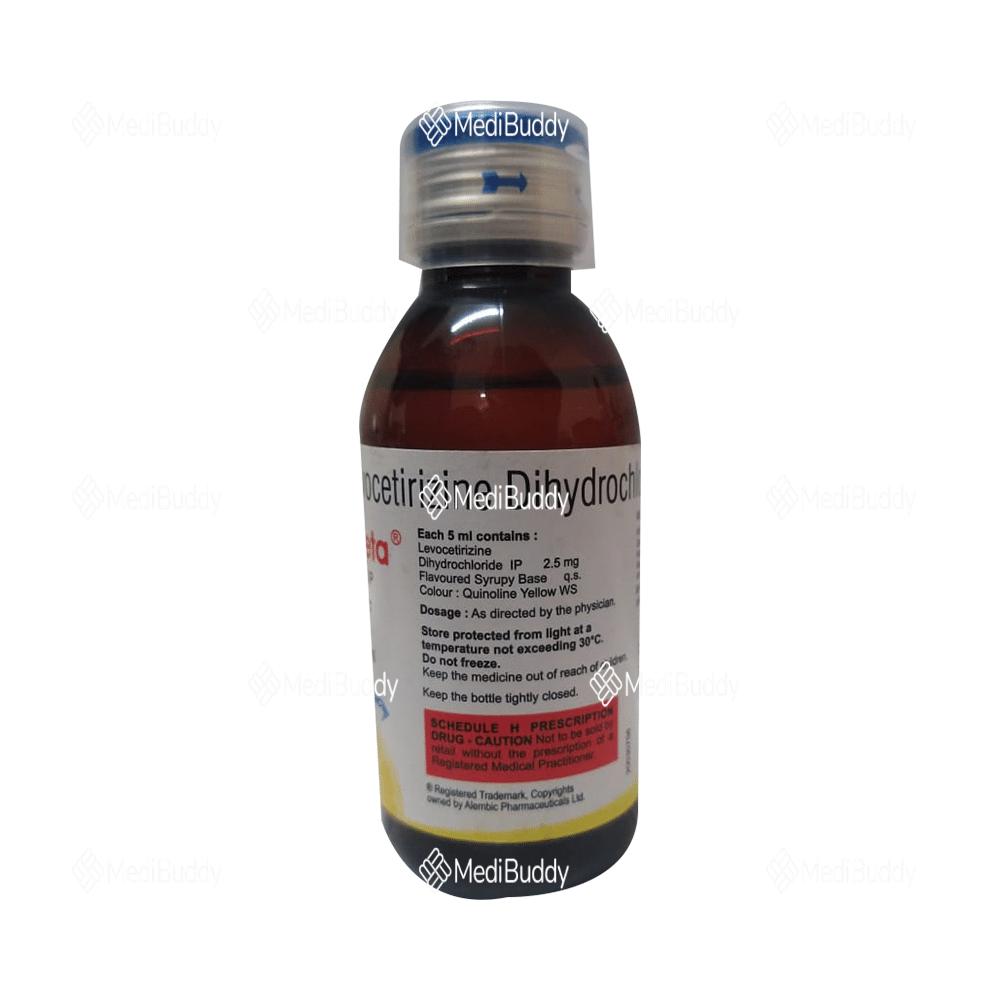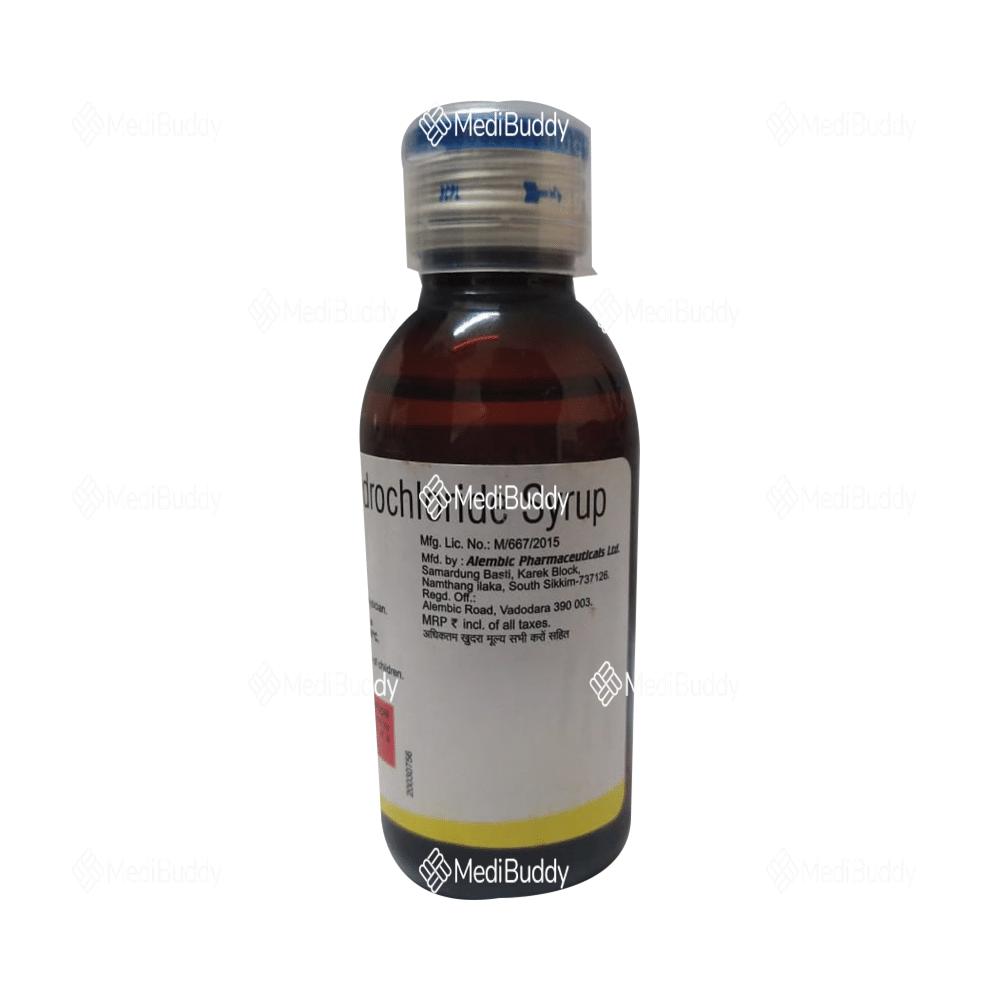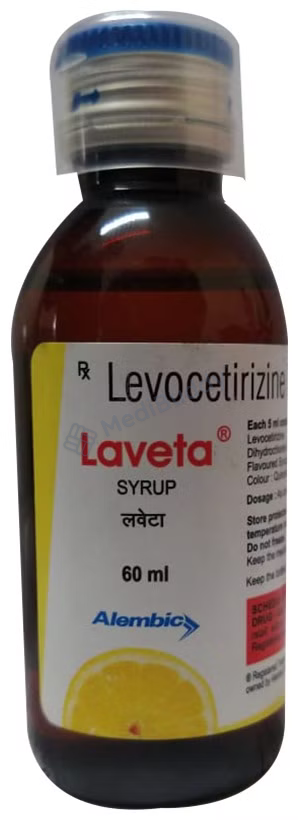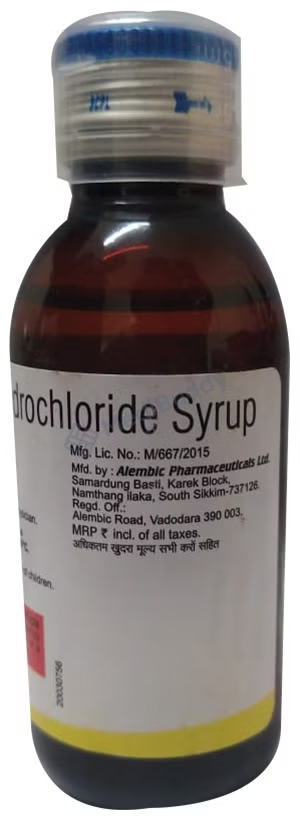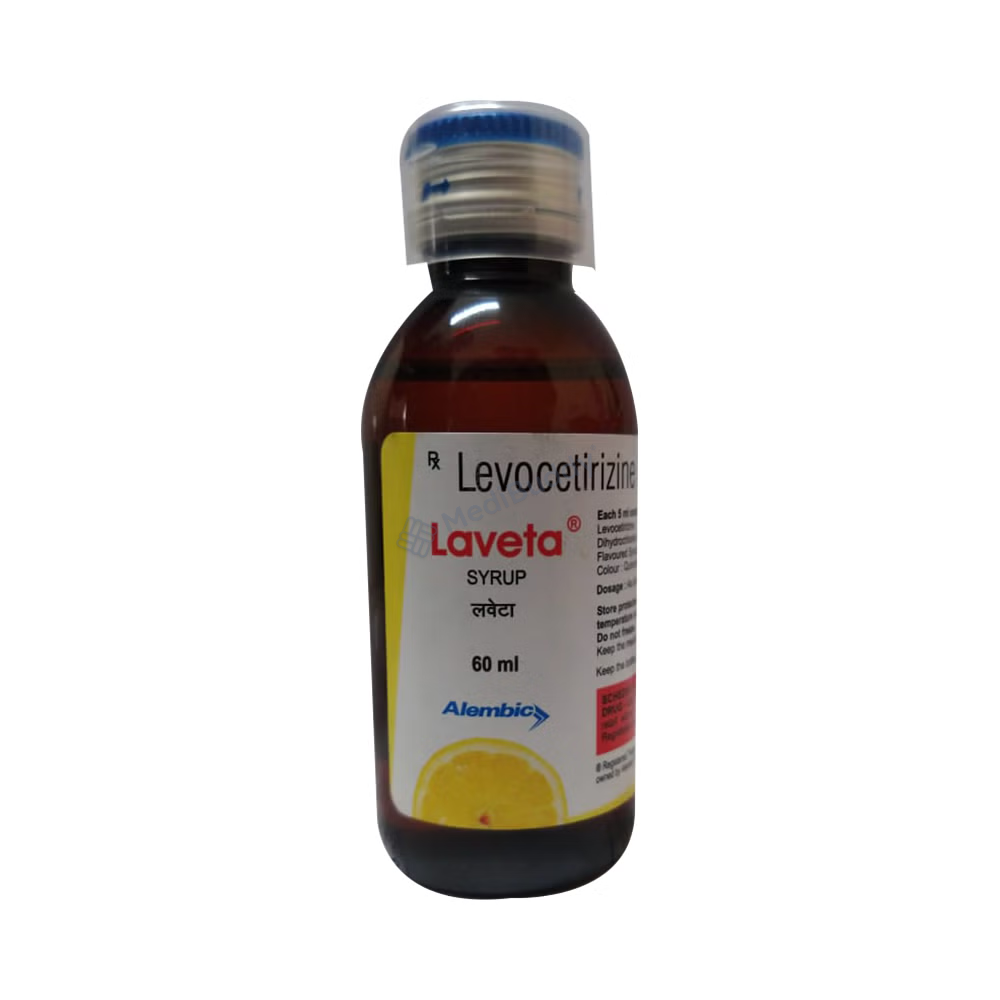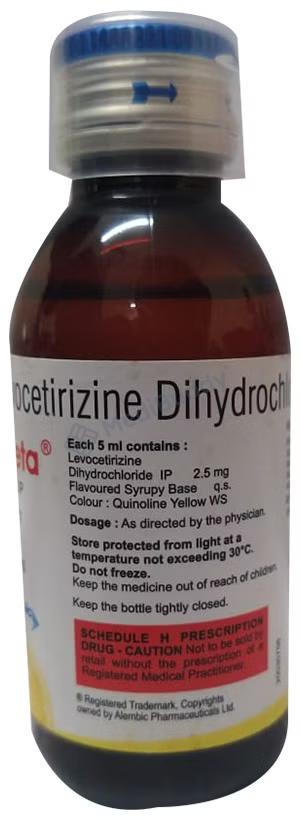Laveta Syrup
By Laveta
Rx
60ml Syrup in a Bottle

Composition
Levocetirizine(2.5mg/5ml)

Manufacturer - Alembic Pharmaceuticals Ltd
Alembic Road, Vadodara - 390 003, Gujarat,INDIA

Expires on or after
October, 2025
About Laveta Syrup
Laveta Syrup is classified as an antihistamine medication, specifically containing levocetirizine, which works to counteract the effects of histamine, a chemical involved in allergic reactions. Allergies, which are immune system responses to usually harmless foreign substances called allergens, manifest differently among individuals. Some may experience allergies to certain foods, seasonal factors like pollen or pet dander, or other triggers leading to conditions such as hay fever, conjunctivitis, eczema, hives, and reactions to insect bites or stings.
Commonly used to alleviate symptoms of allergies, Laveta Syrup 60 ml is prescribed to combat conditions like hay fever triggered by pollen or dust, red and itchy eyes associated with conjunctivitis, dermatitis known as eczema, raised red patches or dots seen in hives, and allergic reactions to insect stings. While beneficial in treatment, it may result in minor side effects for some individuals like headaches, dry mouth, nausea, dizziness, stomach discomfort, and diarrhea. These side effects are typically temporary as the body adapts to the medication; however, if any persist or worsen, immediate medical attention is advised.
Before commencing Laveta Syrup 60 ml, it is crucial to disclose any existing medical conditions, particularly kidney problems, epilepsy, or difficulties with urination, to the healthcare provider. Due to potential interactions, it is essential to inform the healthcare team about all ongoing medications or supplements. Additionally, pregnant or breastfeeding individuals should seek medical advice before using Laveta Syrup 60 ml to ensure safety. Only administer this medication on a doctor's prescription to avoid any adverse effects.
Laveta Syrup, containing levocetirizine and falling under the antihistamine category, is primarily used to address symptoms related to allergic rhinitis (nasal congestion, itchy nose, repeated sneezing, and irritated eyes) and urticaria (a skin condition causing itchy raised reddish patches). It is suitable for both adult and pediatric patients aged two years and above. The recommended dosage and administration guidelines should be strictly adhered to as directed by the healthcare provider, preferably taking the syrup in the evenings or before bedtime, with or without meals.
Individuals with severe kidney issues are advised against using Laveta Syrup, and caution should be exercised by those experiencing drowsiness or fatigue due to potential adverse effects. Dry mouth, headaches, and constipation are among the common side effects associated with Laveta Syrup, prompting consultation with a healthcare provider if these symptoms become bothersome.
Benefits
Laveta Syrup offers a range of benefits for those dealing with allergic conditions. If you are experiencing symptoms like a blocked or runny nose, sneezing, or itchy and watery eyes, this syrup can provide you with much-needed relief. By alleviating these discomforts, Laveta Syrup enables you to carry on with your daily tasks more comfortably. Additionally, it is effective in soothing allergic reactions triggered by insect bites, as well as symptoms associated with conditions like hives and eczema, such as rash, swelling, itching, and irritation. Not only does this help improve the appearance of your skin, but it could also positively impact your mood and self-confidence. One of the standout features of Laveta Syrup is its minimal risk of serious side effects, making it a safe choice for managing allergy symptoms. Another advantage is that it is less likely to cause drowsiness compared to other antihistamine medications. For those using it as a preventive measure, consistent use is recommended for maximum effectiveness. By incorporating Laveta Syrup into your allergy management routine, you can experience relief from bothersome symptoms and enjoy an improved quality of life.
How to use the Laveta Syrup
To use Laveta Syrup, it is essential to follow the guidelines provided by your doctor regarding the dose and duration of use. Before using the syrup, carefully read the directions on the label. Use a measuring cup to accurately measure the dosage, and consume it orally. It is recommended to shake the syrup well before each use to ensure proper mixing of the ingredients. Laveta Syrup can be taken with or without food, although it is advisable to take it at the same time each day for best results. Following these instructions will help you use the syrup effectively and safely to achieve the desired outcome.
Uses of Laveta Syrup
Laveta Syrup is primarily used for the treatment of allergic conditions. This syrup can help alleviate symptoms related to allergies, providing relief to individuals who may be experiencing discomfort due to allergies. It is commonly prescribed by healthcare professionals to manage allergic reactions and their associated symptoms effectively.
What conditions Laveta Syrup treats?
Laveta Syrup, an antihistamine medication, effectively treats allergic conditions like hay fever, conjunctivitis, and skin reactions such as eczema and hives. It relieves symptoms like watery eyes, runny nose, sneezing, and itching. The dose varies depending on the condition, and it can be taken with or without food. Consistent use as advised by your doctor is important to prevent symptoms from returning. Common side effects, such as sleepiness or dry mouth, are usually mild and temporary. Consult your doctor if side effects persist.
Should you consult a doctor?
If you or your child experiences persistent or concerning side effects such as nausea, constipation, dizziness, sleepiness, fatigue, dry mouth, headache, vomiting, or nasopharyngitis while taking Laveta Syrup, it is advisable to seek medical advice. While these side effects are generally mild and temporary, consulting with a doctor is recommended if they persist or become troublesome. Additionally, if you have any kidney problems or epilepsy, inform your doctor before taking this medicine. It is important to be cautious of potential interactions with other medications, so be sure to disclose all the medicines you are currently using to your healthcare provider. If you are pregnant or breastfeeding, discuss with your doctor before using Laveta Syrup, although it is considered safe in such circumstances. Remember, stopping the medication abruptly or missing doses may lead to a recurrence of symptoms, so follow your doctor's guidance regarding the dosage and usage of this medicine.
Side effects of Laveta Syrup
Laveta Syrup is generally safe for children, with most side effects being mild and temporary. If your child does experience side effects, they are typically expected to diminish as the body adjusts to the medication. It is advisable to seek advice from your child’s healthcare provider if the side effects persist or cause discomfort. The common side effects associated with Laveta Syrup may include nausea, constipation, dizziness, sleepiness, fatigue, dry mouth, headache, vomiting, and inflammation of the throat and nasal passages known as nasopharyngitis.
Safety advice

liver
Laveta Syrup is generally considered safe for use in patients with liver disease. It is usually not necessary to adjust the dose of Laveta Syrup based on liver condition. However, in cases of severe liver disease, dose adjustments may be needed. It is advisable to consult your doctor before administering Levocetirizine, the active ingredient in Laveta Syrup, to your child if they have severe liver disease.

kidney
Laveta Syrup needs to be used carefully in individuals with kidney problems. It may require adjusting the dosage, so consult your doctor for proper guidance.
Consumption warning before consuming Laveta Syrup
Before consuming Laveta Syrup, it is important to take note of certain precautions. This medication belongs to the antihistamine group and is commonly used to alleviate symptoms associated with allergies like hay fever, eczema, hives, and insect bites. It works by relieving symptoms such as runny nose, watery eyes, sneezing, and itching. The dosage of Laveta Syrup may vary depending on the condition being treated, and it is typically recommended to be taken in the evening under the guidance of a healthcare provider. It is crucial to follow the prescribed dosage schedule as stopping the medication prematurely may lead to a recurrence of symptoms.
Although Laveta Syrup is generally considered safe, some individuals may experience mild side effects such as drowsiness, dry mouth, fatigue, or headache, which usually diminish as the body adjusts to the medication. It is advisable to consult a doctor if side effects persist or cause concern. Prior to using this medication, inform your healthcare provider if you have kidney issues, epilepsy, are pregnant, or breastfeeding. Additionally, disclose any other medications you are taking to avoid potential interactions.
What if you forgot to take Laveta Syrup?
If you miss a dose of Laveta Syrup, don't panic. Simply give the missed dose as soon as you remember. However, if it's almost time for the next scheduled dose, skip the missed dose and continue with the regular dosing schedule. It's important not to double up on doses to make up for the missed one. Follow the dosing instructions provided by your child's doctor carefully to ensure the medication works effectively.
Related lab tests
Related Lab Tests for monitoring patients taking Laveta Syrup may include:
1. Absolute Eosinophil Count: This test measures the number of eosinophils in the blood. Eosinophils are a type of white blood cell that can increase in response to certain conditions, such as allergies or parasitic infections. Monitoring the absolute eosinophil count can help healthcare providers assess the body's response to Laveta Syrup.
2. Peripheral Smear Examination: This test involves examining a sample of blood under a microscope to evaluate the different types of blood cells present. A peripheral smear examination can provide information on the shape, size, and number of blood cells, including eosinophils and other white blood cells. This test can help detect any abnormalities in the blood that may be related to the use of Laveta Syrup.
3. Total IgE: Total IgE (Immunoglobulin E) is a type of antibody that is associated with allergic reactions. Elevated levels of IgE in the blood can indicate allergies or immune responses. Monitoring total IgE levels can be useful in assessing the potential allergic reactions or immune responses in patients taking Laveta Syrup.
Additional Information
| Habit Forming | No |
| Chemical Class | Piperazine Derivative |
| Therapeutic Class | RESPIRATORY |
| Action Class | - |
FAQs
Disclaimer
The information provided on this website is to the best of our abilities to ensure it is accurate, reliable, and reviewed by a team of professionals. It should not be used to diagnose, prevent, or cure any health problem. The information presented here is not intended to create a doctor-patient relationship or replace a registered medical practitioner's advice, diagnosis, or treatment. The absence or provision of any information or warning regarding any medicine should not be assumed as an implied or explicit assurance of safety or efficacy. We highly recommend consulting your registered medical practitioner for all queries or doubts related to your medical condition. Do not ignore professional medical advice or delay seeking it based on the content encountered on our website. We intend to support, not replace, the doctor-patient relationship.
₹123.95
Inclusive of all taxes
Content verified by

Dr. Upasana Bhatia
MBBS - General Medicine
Last update on 01-Oct-2024
